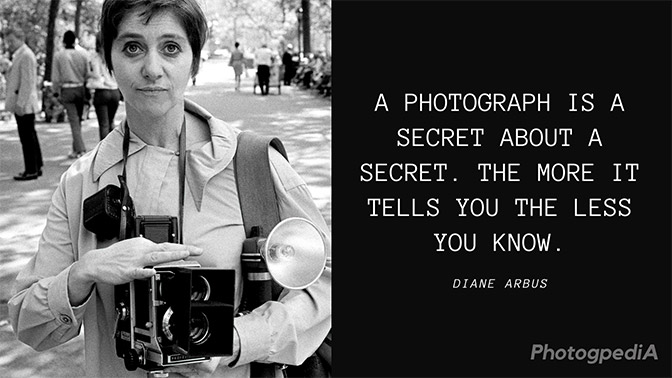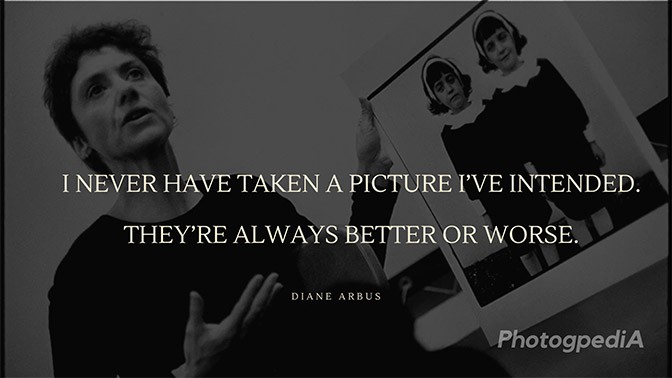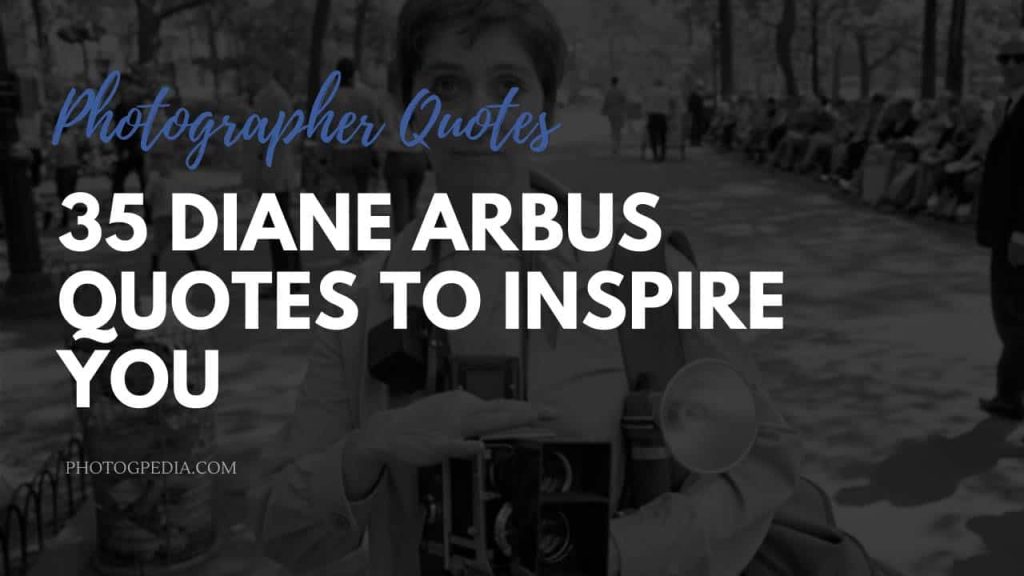Looking for Diane Arbus quotes? Below, we have listed 35 of our favorite Arbus quotes that will give you pause for thought, and provide inspiration for your own photography projects.
If you want to learn more about the life and career of Arbus, we recommend reading our master profile article Diane Arbus: A Different Perspective.
Diane Arbus Quotes
My favourite thing is to go where I’ve never been.
There’s a kind of power thing about the camera. I mean everyone knows you’ve got some edge. You’re carrying some magic which does something to them. It fixes them in a way.
I always thought of photography as a naughty thing to do – that was one of my favorite things about it, and when I first did it, I felt very perverse.
… invention is mostly this subtle, inevitable thing…I mean it comes from your nature, your identity. We’ve all got an identity. You can’t avoid it. It’s what’s left when you take everything else away. I think the most beautiful inventions are the ones you don’t think of.
I don’t press the shutter. The image does. And it’s like being gently clobbered.
I’m not as good a photographer as people think except sometimes and in my head.
If I were just curious, it would be very hard to say to someone, “I want to come to your house and have you talk to me and tell me the story of your life.” I mean people are going to say, “You’re crazy.” Plus they’re going to keep mighty guarded. But the camera is a kind of license. A lot of people, they want to be paid that much attention and that’s a reasonable kind of attention to be paid.
Photography was a license to go wherever I wanted and to do what I wanted to do.
It’s always seemed to me that photography tends to deal with facts whereas film tends to deal with fiction.
A photograph is a secret about a secret. The more it tells you the less you know.

The Subject
For me the subject of a picture is always more important than the picture. And more complicated. I do have a feel for the print but I don’t have a holy feeling for it.
Freaks [were] a thing I photographed a lot. It was one of the first things I photographed and it had a terrific kind of excitement for me. There’s a quality of legend about freaks. Like a person in a fairy tale who stops you and demands that you answer a riddle. Most people go through life dreading they’ll have a traumatic experience. Freaks were born with their trauma. They’ve already passed their test in life. They’re aristocrats.
There’s a quality of legend about freaks. Like a person in a fairy tale who stops you and demands that you answer a riddle.
The world is full of fictional characters looking for their stories.
Take pictures of what you fear.
I really believe there are things nobody would see if I didn’t photograph them.
I’m very little drawn to photographing people that are known or even subjects that are known. They fascinate me when I’ve barely heard of them.
The Chinese have a theory that you pass through boredom into fascination and I think it’s true. I would never choose a subject for what it means to me or what I think about it. You’ve just got to choose a subject – and what you feel about it, what it means, begins to unfold if you just plain choose a subject and do it enough.
Choosing a project can be ironic. Everybody’s got irony. You can’t avoid it. It’s in the structure, the detail, the significance…What I mean is, I would never choose a subject for what it means to me. I choose a subject and then what I feel about it, what it means, begins to unfold.
There are an awful lot of people in the world and it’s going to be terribly hard to photograph all of them… It was my teacher Lisette Model who finally made it clear to me that the more specific you are, the more general it will be.
Everybody has that thing where they need to look one way but they come out looking another way and that’s what people observe. You see someone on the street and essentially what you notice about them is the flaw.
Diane Arbus Quotes on Photography Technique
What moves me about…what’s called technique…is that it comes from some mysterious deep place. I mean it can have something to do with the paper and the developer and all that stuff, but it comes mostly from some very deep choices somebody has made that take a long time and keep haunting them.
In the beginning of photographing, I used to make very grainy things. I’d be fascinated by what the grain did because it would make a kind of tapestry of all these little dots… But when I’d been working for a while with all these dots, I suddenly wanted terribly to get through there. I wanted to see the real differences between things… I began to get terribly hyped on clarity.
Taking pictures is like tiptoeing into the kitchen late at night and stealing Oreo cookies.
I work from awkwardness. By that I mean I don’t like to arrange things. If I stand in front of something, instead of arranging it, I arrange myself.
I don’t know what good composition is… Sometimes for me, composition has to do with a certain brightness or a certain coming to restness and other times it has to do with funny mistakes. There’s a kind of rightness and wrongness and sometimes I like rightness and sometimes I like wrongness.
If you scrutinize reality closely enough, if in some way you really, really get to it, it becomes fantastic.
Photography is “real” because the camera is “recalcitrant”. It’s determined to do one thing and you may want to do something else.
The thing that’s important to know is that you never know. You’re always sort of feeling your way.
The Photograph
One thing that struck me very early is that you don’t put into a photograph what’s going to come out. Or, vice versa, what comes out is not what you put in.
[Photographs] are the proof that something was there and no longer is. Like a stain. And the stillness is boggling. You can turn away but when you come back they’ll still be there looking at you. (March 1971, six months prior to her suicide)
Lately I’ve been struck with how I really love what you can’t see in a photograph. An actual physical darkness. And it’s very thrilling for me to see darkness again.
Your images mean more to you than to anybody else.
Some pictures are tentative forays without your even knowing it. They become methods. It’s important to take bad pictures. It’s the bad ones that have to do with what you’ve never done before. They can make you recognize something you hadn’t seen in a way that will make you recognize it when you see it again.
Recently I did a picture – I’ve had this experience before – and I made rough prints of a number of them. There was something wrong in all of them. I felt I’d sort of missed it and I figured I’d go back. But there was one that was just totally peculiar. It was a terrible dodo of a picture. It looks to me a little as if the lady’s husband took it. It’s terribly head-on and sort of ugly and there’s something terrific about it. I’ve gotten to like it better and better and now I’m secretly sort of nutty about it.
I’ve got incredible power in my closet. Not power to do harm – just the feeling that I’ve captured people who have since died and people who will never look that way again. The camera is cruel, so I try to be as good as I can to make things even.
I never have taken a picture I’ve intended. They’re always better or worse.

What’s your Favorite Diane Arbus Quote?
Have a favorite Diane Arbus quote from the list? Let us know in the comment section below.
Don’t forget to bookmark this page, or print it out, and refer to it next time you need some inspiration. Also, don’t forget to share it with others through the usual channels (social media, forums, websites, etc).
To learn more about Diane Arbus’s photography, we recommend reading our Diane Arbus master profile article. To see more of of her work, check out the Arbus image archive at Artsy.net
Looking for more words of wisdom from master photographers? Check out the quotes section of Photogpedia for more great photography quotes.
More Quote Articles:

